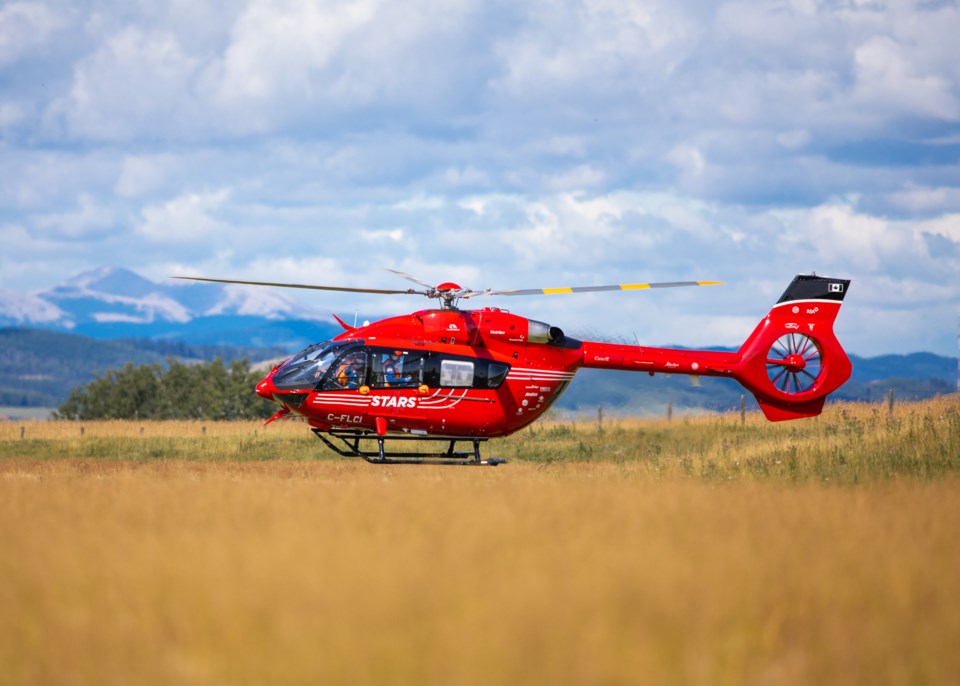Foothills County has opted to provide STARS Air Ambulance with the same level of funding as previous years after hearing about the organization’s financial situation in 2020.
Glenda Farnden, major gift manager for STARS, met with Foothills councillors on Dec. 9 to provide an update on the service and its fundraising efforts over the past year.
“2020 has been like no other,” said Farnden. “COVID-19 has changed all our lives. STARS’ number-one priority is to maintain and protect unaffected operations.”
She said rigorous personal protective equipment (PPE) standards and anti-contamination procedures have been put in place, as well as a buddy system to ensure oversight on every mission as a safeguard.
In addition, STARS developed an online portal system to assist health-care professionals with resuscitation protocols, and its experts advise medical personnel at rural hospitals on oxygenation and ventilation procedures, which are of utmost importance during the pandemic, she said.
At the same time, the number of calls related to the virus has increased, with an average of 13 per cent of missions being confirmed or suspected COVID cases, and it has been as much as 18 per cent at times, said Farnden.
There are many other call types related to COVID as well, she said.
“These are stressful times and we are continuing to see a rise in stress-related types of missions, like heart attacks, stroke, drug overdose,” said Farnden.
With the economic situation in Alberta, despite a steady mission rate STARS is seeing a decline in funding, including provincial. Its 10-year affiliation agreement with Alberta Health Services, which provided 20 per cent operational funding, expired.
In 2019, STARS received $9.2 million from the Province. During a recent review the AHS agreement was extended until September 2021, which she said will amount to about $7.3 million for 2021.
Fundraising events have been cancelled and campaigns that typically bring in significant dollars are waning during the pandemic. Annual calendar sales usually bring in between $800,000 and $1 million per year, and the home lottery typically sells out and accounts for around $11.5 million.
“The 2020 STARS lottery did not sell out and that reflected a $1.2-million loss of revenue,” said Farnden, adding the calendar campaign is down by half this year.
STARS will launch its 2021 lottery in January and hopes to see sales pick up in the new year for future funding, she said.
It will be necessary as the organization anticipates a rise in aviation expenditures, which she said are reflective of an increase in missions and pilot training for the new fleet of helicopters. To help mitigate some expenses, STARS downsized its administrative staff across its six bases in Alberta and Saskatchewan.
The helicopter replacement program was a nearly $30-million capital campaign undertaken in 2018 to phase out the aging BK117 units, which have been in service for 35 years, and bring in nine new H145 helicopters. The total cost of the project was $117 million but STARS received a $65-million federal grant that covered five units, and the Government of Saskatchewan paid for a machine in Saskatoon with AHS footing the bill for one Alberta unit.
STARS was left to fund two of its nine new helicopters.
“During the capital campaign, COVID-19 hit,” said Farnden. “However, we must not lose sight of the visions as the future of Albertans depends on it.”
About $14 million has been raised toward the fleet to-date, she said.
Currently three of the H145s have been delivered, two are operational in Calgary and Saskatoon, and two more will be delivered by the end of 2020. The entire fleet is expected to be in operation by the end of 2022, said Farnden.
She said there is opportunity to sell the BK117 legacy fleet, which is still viable on the market and could help cover as much as half of the remaining cost of purchasing helicopters and equipment, as well as paying for training.
The most unwavering support to-date has been that of municipalities, despite facing uncertainty with provincial funding models and the economic decline.
“You continue to be a lifeline for STARS and we are very grateful,” said Farnden. “Our partnership represents an unparalleled element of hope and a chance at life.”
Foothills County has partnered with STARS since 1992, and over the last several years has contributed $20,000 per year.
Harry Riva Cambrin, Foothills County manager, said the funding provided by the County is typically sent at the end of the year, so its 2020 amount is being forwarded to STARS this month.
“Within the proposed 2021 budget, the amount is the same as it was last year so depending on council’s deliberations on the budget, a decision will be made either to continue that level of support or alter it in some way,” he said.
While budget discussions have just begun for the County, councillors indicated they would like to keep their contributions to STARS at the same level.
“I’m fine with staying with support as we have done previous,” said Coun. Jason Parker.
Foothills County will settle its 2021 budget in the spring.




